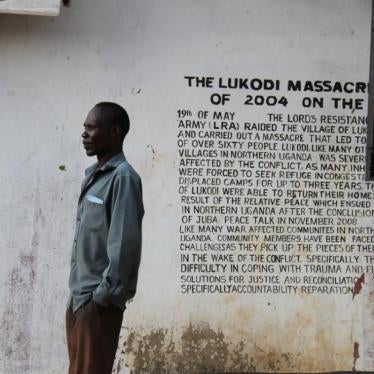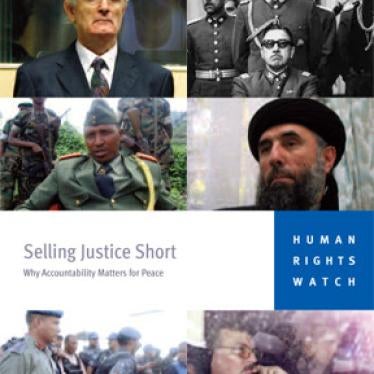On December 3, 2005, Richard Dicker, director of Human Rights Watch's International Justice Program, addressed the final plenary at the 4th Assembly of States Parties session of the International Criminal Court in The Hague.
As we know, 2005 has been a momentous year for the ICC on several fronts. The court is moving forward on investigations in three different country situations. It has issued its first arrest warrants. It has received the first referral from the Security Council. And just three weeks ago at UN headquarters, we witnessed the president of the court, Philippe Kirsch, present the first ever report of ICC activities to the General Assembly. Much progress has been made, but we all know the difficult challenges that lie ahead.
At this juncture, the need for robust support from an increasingly active and self-confident ASP is crucial if the court is to meet these challenges. Human Rights Watch believes this support necessary on two levels. First, to obtain cooperation from states, various UN agencies and other international organizations. Second, to fulfil the ASP’s broad responsibilities to the court.
I will speak first on what will be the crucial issue of cooperation. There can be no question that active support by the ASP (and where needed support from regional groupings of states parties) will help determine whether the ICC reaches its goals. There are important lessons to be learnt from recent experience of the Yugoslav war crimes tribunal. Over the last year, twenty indictees voluntarily surrendered themselves to the tribunal. It was not the weight of numerous Security Council resolutions that secured the cooperation in the former Yugoslavia. Rather, it was the diplomatic signals sent by the European Union and others that prompted the government of Serbia and Montenegro to act. Undoubtedly, the ICC will need similar demonstrations of support from its one hundred states parties to effectuate arrests and other forms of cooperation from any government that might obstruct the court’s mandate.
The need for robust support from the ASP is clear on a second level: the assembly’s broad oversight responsibility for the court’s activities. Human Rights Watch believes that to succeed the ICC, assisted by the assembly, must formulate a vision that will enable the court to realize the potential of the Rome Statute. The vehicle for this institutional vision is the Strategic Plan scheduled for completion by the court in early 2006. We are excited about the opportunity the Strategic Plan will provide. We believe the plan should foster a broad discussion about the ICC’s mission. We will be urging the court to include elements that will maximize the ICC’s impact among the communities most affected by the crimes. These elements should, of course, include a clear projection of costs, overall operational blueprints, as well as plans for efficient investigations and fair, effective trials. But the strategic plan must also embody in its vision, elements for a high court profile in the field. This means specific plans to maximize the court’s impact through: 1) effective participation of victims, 2) broad outreach to explain its mandate, 3) visible field presence, and 4) in-situ proceedings. These are not optional items rather they are central to implementing the court’s mission.
We are earnestly looking forward to what will be a rich and stimulating discussion. We urge the ASP to adopt a procedure that will maximize the opportunities for just such a discussion. In this regard, once the court has completed its work on the plan and coveys it to the ASP, we will be looking to the bureau and its wise, dynamic new president to implement the relevant provisions of the omnibus resolution. We hope to see the bureau arrange a transparent, focused discussion in which states parties and civil society can offer feedback to court officials. This process must facilitate constructive and thoughtful input for court officials to consider. At the end of the day, they, as the leadership of an independent judicial institution, will ultimately decide what to incorporate from this dialogue.
We look to 2006 with both optimism and a sober view. We look forward to working together in the next crucial phase of our joint effort to end impunity for the crimes of most concern to the international community.






